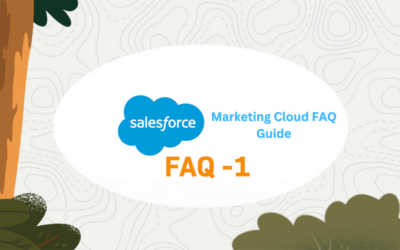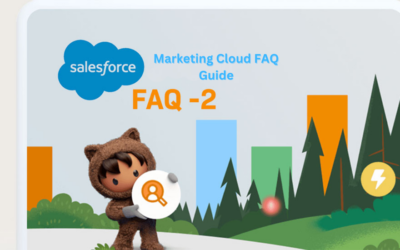In the world of marketing automation, Pardot has emerged as a powerhouse. Pardot, a robust B2B marketing automation platform by Salesforce empowers businesses to streamline their marketing efforts, nurture leads, and drive revenue. One of the key features that make Pardot stand out is its lead-scoring capabilities. Lead scoring is not just a buzzword; it’s a strategic approach that enables you to identify and prioritize your best prospects. In this article, we will dive deep into Pardot lead scoring and how it can transform your marketing strategy. If you need assistance with Salesforce Pardot setup and optimization, companies like CRM Force can provide valuable expertise and support.
1. Understanding the Basics of Lead Scoring
What is Lead Scoring?
Pardot, at its core, is all about helping you engage with the right prospects at the right time. It goes beyond simply collecting leads; it focuses on identifying which of those leads are most likely to convert into customers. This is where lead scoring comes into play.
Moreover, Pardot allows you to customize scoring rules to match your specific business needs. You can assign different values to different actions, ensuring that your lead scoring model aligns perfectly with your sales funnel.
Why is Lead Scoring Important?
Lead scoring in Pardot is a systematic method for assigning values to leads based on their behavior and demographics. It helps you quantify and qualify leads, ensuring that your sales team focuses their efforts on those most likely to convert. This means you’re not wasting valuable time and resources on leads that are not a good fit for your business.
2. The Components of Lead Scoring
Demographic Data
Pardot takes lead scoring to the next level by incorporating demographic data that encompasses information such as job titles, company size, and industry. This data provides insights into the characteristics of your leads and whether they align with your ideal customer profile. Leads that closely match your target audience are typically assigned higher scores.
Behavioral Data
Behavioral data delves into the actions that leaders take as they interact with your brand. Pardot provides a holistic view of your prospects. These actions can include website visits, email opens, content downloads, webinar attendance, and more.
Behavior-based
scoring acknowledges the engagement level of each lead and their interest in your offerings. Engagement Scoring Engagement scoring involves assigning values to different interactions a lead has with your brand. For example, a lead visiting your product pricing page may receive a higher score than someone who merely browses your homepage. This scoring system quantifies the intensity of interest and engagement.
Fit Scoring
Fit scoring evaluates how closely a lead aligns with your ideal customer persona. Factors considered here include industry, company size, and job role. Leads that mirror your ideal customer profile closely are typically given higher scores, as they are more likely to convert.
3. Implementing Lead Scoring in Your Business
Define Your Ideal Customer Profile
The foundation of an effective lead scoring system lies in a well-defined ideal customer profile (ICP). To create this profile, work closely with your sales and marketing teams to outline the characteristics, demographics, and behaviors that define your most valuable customers. Your ICP serves as the benchmark for scoring leads.
Set Scoring Criteria
Once your ICP is established, the next step is to set scoring criteria. This involves assigning values to different attributes and behaviors based on their significance in predicting the potential of a lead to convert. Collaboration between marketing and sales teams is essential to ensure that both departments agree on the scoring system. Pardot offers lead grading, another powerful feature.
Integrate Your CRM and Marketing Automation Tools
Efficiency is key in lead scoring. To streamline the process and maintain data accuracy, integrate your Customer Relationship Management (CRM) and marketing automation tools. This integration enables real-time data exchange, ensuring that lead scores are always up-to-date.
Regularly Review and Adjust Your Scoring Model
Lead scoring is not a static process. It requires ongoing evaluation and refinement. Regularly review the performance of your scoring model and make adjustments based on the feedback received from sales teams, as well as the actual conversion rates of scored leads.
4. The Benefits of Lead Scoring
Improved Conversion Rates
One of the strengths of Pardot is its automation capabilities, and lead scoring is no exception. By focusing your efforts on leads with high scores, you can significantly improve your conversion rates. These leads are more likely to respond positively to your marketing and sales efforts.
Increased Sales Efficiency
Effective lead scoring allows your sales team to prioritize their efforts on leads that are most likely to convert. This results in higher productivity and more closed deals.
Better Marketing ROI
Targeted marketing efforts lead to a better return on investment. By allocating your resources to high-scoring leads, you can maximize your marketing budget’s impact.
Enhanced Customer Retention
Identifying the best prospects early on enables you to tailor your communication and engagement strategies. This personalized approach can lead to higher customer retention rates, as you provide a superior experience that resonates with your audience.
5. Lead Scoring Best Practices
Regularly Communicate with Your Sales Team
Maintain an open line of communication with your sales team. Their feedback on lead quality and conversion rates is invaluable in refining your scoring criteria.
Use Lead Scoring in Nurturing Campaigns
Integrate lead scoring into your lead nurturing campaigns. This allows you to deliver tailored content and offers based on a lead’s score and behavior, increasing the chances of conversion.
Combine Lead Scoring with Personalization
Leverage lead scores to deliver personalized experiences. Tailor your communications and offers to match the interests and engagement levels of your leads, enhancing their overall experience with your brand.
Continuously Train Your Teams
Regular training is essential to ensure that your marketing and sales teams understand and utilize lead scoring to its full potential. Stay updated on best practices and industry trends to refine your strategies.
Conclusion
In conclusion, Pardot lead scoring is a game-changing tool that can significantly enhance your B2B marketing efforts. By leveraging both behavioral and demographic data, you can identify and prioritize your best prospects. This not only boosts your conversion rates but also ensures that your sales team is focusing their efforts where they matter most.
So, if you’re looking to supercharge your marketing automation efforts, consider incorporating Pardot lead scoring into your strategy. It’s the key to unlocking the full potential of your prospect pool, ultimately driving higher ROI and revenue for your business. Don’t miss out on the power of Pardot lead scoring; start optimizing your marketing strategy today. To learn more about how CRM Force can assist you in recruiting top CRM talent and optimizing your CRM strategies for successful drip campaigns, contact us today. Together, let’s maximize your customer engagement. Contact us today.





